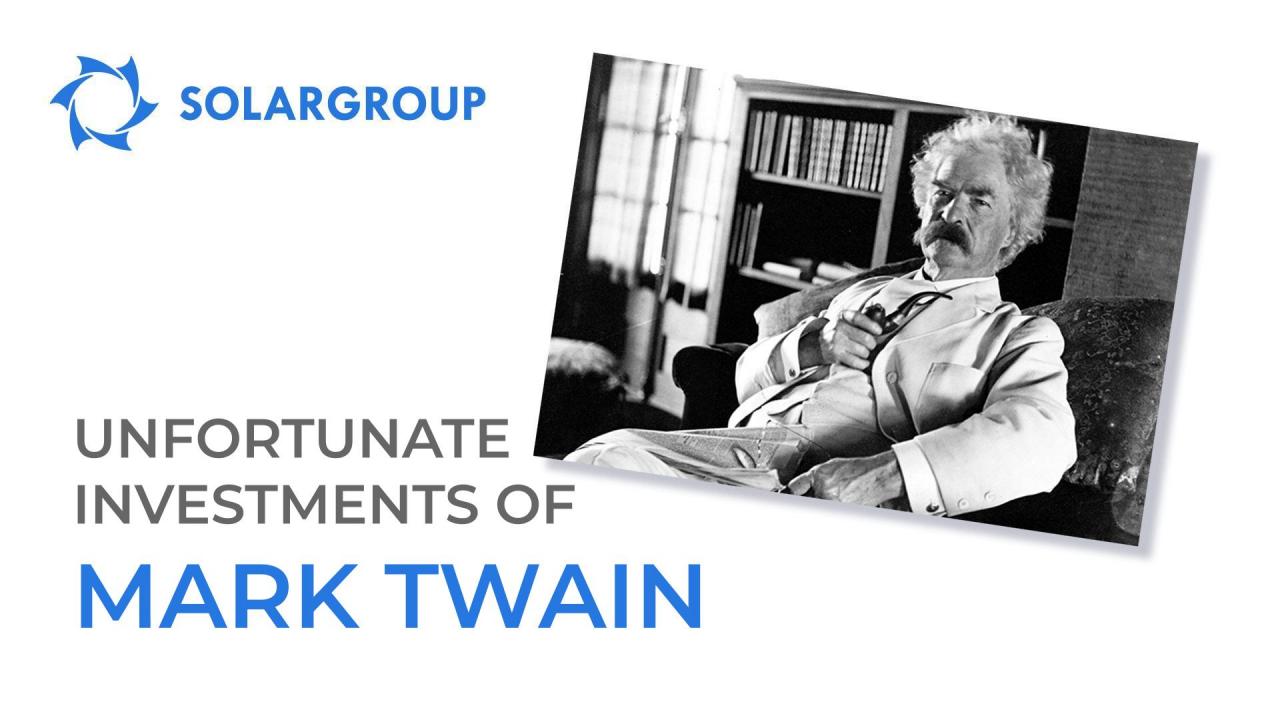
Investment failures of Mark Twain
Mark Twain is one of the most famous writers of the 19th century. For more than half a century, he had been producing stories, novels, plays and short stories that became popular with readers in a lot of countries. "The Adventures of Tom Sawyer" is perhaps the most famous of his works, a story that has been translated into almost all the world languages.
It is not surprising that Mark Twain made a great living and could have become a very rich man if it hadn't been for his passion for investing in doubtful projects. His ardent faith in one "promising" invention after another emptied his bank account again and again, forcing him to start earning "from scratch".
This unwise financial behavior led the 59-year-old literary genius to bankruptcy: on the advice of his financier friend, he declared himself insolvent and gave his wife all the copyrights for his books so that they would not go to creditors.
What did Mark Twain invest in at the end of the 19th century? Here is the story of his failures:
Publishing business. In 1884, Mark Twain opened his own publishing house, because he was dissatisfied with his cooperation with other publishers considering them to be deceivers. After the first two successfully released books, there was a lull associated with the selection of works that were not interesting to the reader. Strategic mistakes in the collaboration with authors resulted in the bankruptcy of Twain's publishing house in 1888.
James Paige's automatic typesetting machine. This "revolutionary" invention was supposed to make text typing 6 times faster as compared to human work and revolutionize the world of publishing. Fascinated by the mechanism of the machine, in the period from 1880 to 1894 Twain invested in its development and modernization about $300 thousand; in terms of today's exchange rate, the investment amount was $4 million. He described the mechanism as follows: "All the wonderful inventions of the human brain pale in comparison with this terrifying mechanical miracle." Unfortunately, the Page typesetter constantly broke down, and while the inventor was refining it for as long as 14 years, more modern and cheaper rivals entered the market.
Plasmon protein powder. Twain invested $30,000 in this wonderful powder with the nutritional value "16 times greater than a steak." The writer believed that Plasmon would help to stop the famine in India, but in 1907, the manufacturing company was found to be fraudulent. Mark Twain was not able to get his investments back.
His own inventions. A talented person is talented in many ways, if not in everything. That's what Twain thought when he patented his developments: an elastic button-down strap to make the trousers "hang more gracefully," a scrapbook, a history board game, and a set of scoops. Besides, the writer invented a baby blanket clip so that babies would not get uncovered during sleep, and a pin for women's hats that protects the wearers from losing the accessory due to a strong wind.
Speculations in the stock market. Twain managed to lose a large sum of money here too: after buying the shares of the Oregon transcontinental railroad for $78, he was able to sell them for only $12 after the value of these securities collapsed.
The list is impressive, isn't it?
The irony is that Twain refused to invest money in the only truly worthy project. This is a device for transmitting sound invented by Alexander Graham Bell. The inventor personally offered Twain to invest in his brainchild for a share in the future company, but the writer refused explaining it with his negative experience of investing in technological inventions. That's how he passed up the potential profit that would have been enough to provide a comfortable life for the future generations of his family. In 1877, Bell and his partners founded the Bell Company which eventually grew into the giant telecommunications company AT3333T.
After multiple unfortunate investments, Mark Twain came to this conclusion: "There are two times in a man's life when he should not speculate : when he can't afford it, and when he can". Do you agree with this statement?

